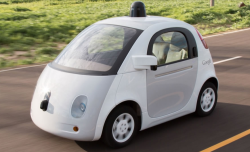
— Although a year behind schedule, the California Department of Motor Vehicles (DMV) finally released its proposed rules and regulations concerning autonomous vehicles, also known as self-driving or driverless cars.
California defines "autonomous vehicle” as a vehicle that is operated or driven without active physical control by a "natural person" sitting in the driver’s seat with the autonomous technology engaged.
While the regulations aren't final, the wording of the proposed rules has some manufacturers concerned about testing their cars in California. Leading the chant against the current DMV rules is Google, the primary company pushing for cars without human drivers.
Google wants cars without steering wheels or pedals, making a "driver" only an "occupant," something the California DMV says isn't in the foreseeable future.
But Google isn't the only company with an interest in driverless cars. As of December 3, 2015, the California DMV has issued autonomous vehicle testing permits to the following companies:
- BMW
- Bosch
- Cruise Automation
- Delphi Automotive
- Ford
- Honda
- Mercedes Benz
- Nissan
- Tesla Motors
- Volkswagen Group of America
Proposed California Driverless Car Regulations
California says a manufacturer must certify the self-driving car meets all safety and performance requirements and be tested by a third-party organization. The third-party test will be conducted to independently verify the car can perform "key driving maneuvers" found in real-world driving conditions.
The DMV also says a normal driver's license won't get the job done in a self-driving car. According to the proposed regulations, a driver must have a standard license in addition to an "autonomous vehicle operator certificate" issued by the California DMV.
The operator must always monitor the safe operation of the car and immediately take control if the self-driving car experiences any type of failure or emergency. That means no sleeping or "driving" under the influence of drugs or alcohol in the driverless car. Furthermore, a "driver" will be responsible for all traffic violations that occur while the car is operating.
The manufacturer must also create a consumer education plan and a "behind-the-wheel" program to provide consumers with all information about the car. The training will include how the technology is turned on, turned off, used and monitored.
Every manufacturer approved for vehicle deployment will be issued a three-year permit under the condition the car is either driven only by the manufacturer or on a lease-only basis to the public.
During the three-year period, a manufacturer must submit monthly reports regarding accidents, safety issues, performance and how much the cars are used on the roads.
Further proposed rules address how a manufacturer of a self-driving car collects data from the vehicle, including by informing consumers what data is collected and how it's used.
Then there is the subject of hacking. Every driverless car must be able to detect and alert an operator to threats from cyberspace. If a threat is detected, an operator must have the ability to immediately turn off the autonomous technology and take control of the car.
As for cars capable of operating without the presence of a driver, the DMV says the cars should stay off the roads until more is known about the technology. California says manufacturers need to obtain more experience in testing actual driverless cars on public roads before the cars are available to the general public.
The DMV says future regulatory packages will need to address the safety, performance and equipment requirements associated with true driverless cars.
Google is not happy with the proposed rules and says a self-driving car will take away the entire "burden" of getting from point A to point B. The company says putting a driver behind a wheel will only cause accidents and having a driver on stand-by to take over will only cause problems.
Saying drivers can't be trusted to multitask in a self-driving car, Google says the only option is a car that drives itself without any driver input.
Accusing California of shrinking back from its leadership role in self-driving cars, Google says the proposed DMV rules "maintains the same old status quo and falls short on allowing this technology to reach its full potential, while excluding those who need to get around but cannot drive."




